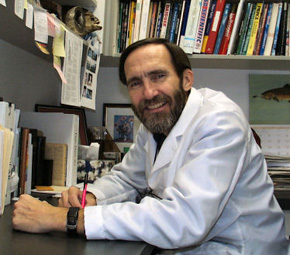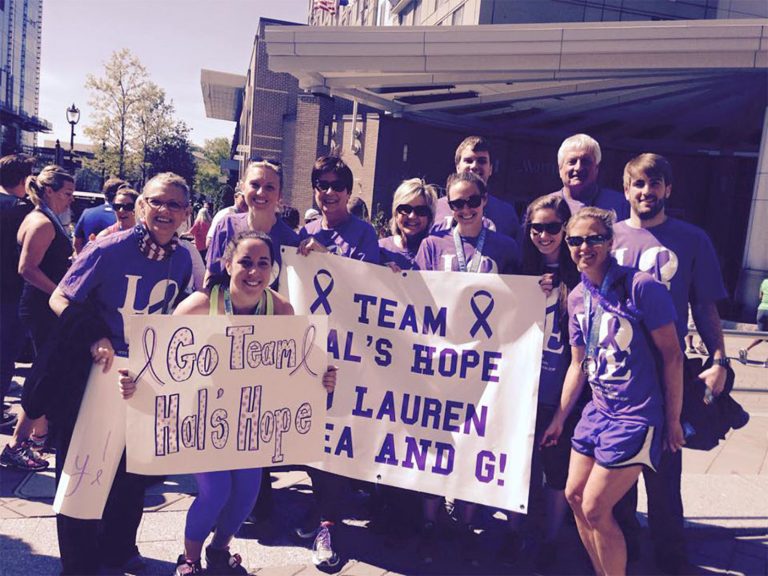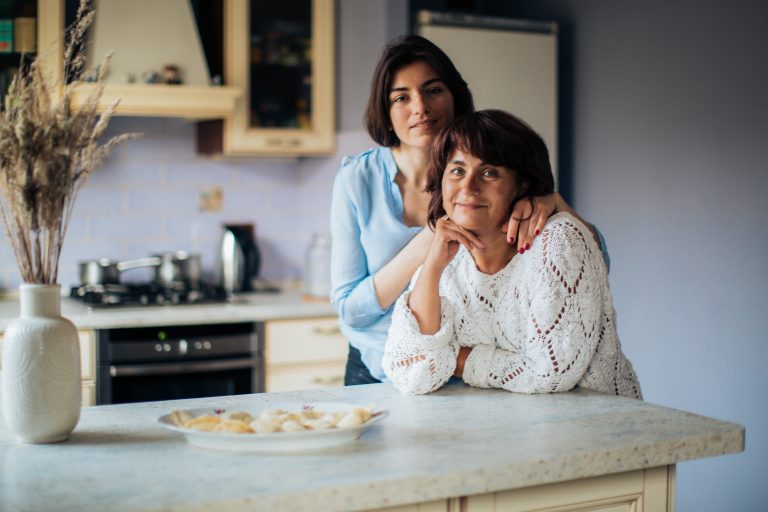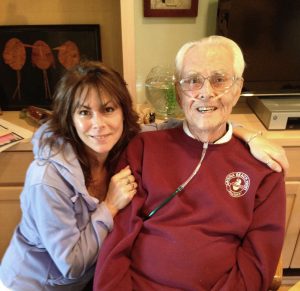Spiritual Well-being and Quality of Life for Patients Undergoing Chemotherapy
Pancreatic Cancer Blog – Commentary on Articles and AbstractsHere is where we take complex medical articles and break them down into language you and I
For over 22 years pancreatica.org has provided current, credible, and comprehensive information to those in need.
Cancer Patient’s Alliance is a 501(c)(3) non-profit organization. All donations are tax-deductible.
94% of all revenue goes towards our programs, with only 6% towards MANAGEMENT AND GENERAL EXPENSES.
Dale Haskell was diagnosed with ampullary pancreatic cancer in December 1996, at the age of 46. The tumor was 1.5 – 2.0 cm and grew over the ampullary duct area (the place where the combined bile duct and pancreatic duct meets the small bowel). He underwent the Whipple procedure in January 1997. Chemo was 5FU with radiation. Care was received at the University of Florida’s Shands Cancer Center. His surgeon was Dr. Steve Vogel; his oncologist was Dr. Robert Marsh. Dale’s primary caregiver, his wife Karen Haskell, also contributed to this story.
Dale and Karen live in the Gainesville, Florida area. At the time of diagnosis, they had been married 2 years and Karen, previously a widow, had adult children. Concurrently with Dale’s medical treatment, Karen was also a part-time caregiver for her mother, a Parkinson’s disease sufferer who in August of 1997 came to live with them. Both were originally from New England, but met in Florida through their church. Their faith in Jesus Christ has been the cornerstone of their lives together, as well as of their journey with this disease.
Karen is on the administrative staff of the City of Gainesville. Dale is a senior biologist at the University of Florida. Realizing a lifelong dream, they’ve since moved to a nearby lake community near some of their children and grandchildren. Dale is also a survivor of kidney cancer, basal cell skin cancer, and a prostate scare (50 biopsies, but no malignancy) found. None of these appears to be related to this particular illness.
During the spring and summer of 1996, Dale “had two episodes of pain in the middle of my back a few months apart. The pain from the second was so intense, it had me down on all fours.” A sonogram identified a dilated pancreatic duct, and a subsequent CT scan showed no immediate signs of a tumor. But with four other pancreatic cancer patients, Dale’s gastroenterologist, Dr. Stavros Diavolitsis, wanted to treat him aggressively. So he scheduled an ERCP – the x-ray/endoscopic procedure commonly used to investigate problems in the pancreas and related areas.
“Thanksgiving week, the night before the scheduled ERCP, I woke up with fever, chills, and vomiting. The next day, upon hearing of this, my gastroenterologist postponed the procedure. On Thanksgiving Day I could barely eat at all. By Friday my urine was brown and my stools were white and I was jaundiced. I went to the ER and was admitted. Finally, the planned endoscopy occurred, revealing a tumor that had blocked the ampullary duct. A stent was inserted, and a biopsy ultimately diagnosed malignant adenocarcinoma.
Looking back then, Karen realized he had been losing weight – about 25 pounds. But since he had gained 30 pounds since they’d been married, she’d thought he was heading back in a good direction.
Speaking of awareness, neither now recalls being aware of the tough statistics surrounding this cancer – at least before the operation. Says Karen, “I knew it was a big deal in general, because of folks’ reactions and because of how complex the surgery was expected to be.” But not the difficult prognosis. But she feels sure that Dale knew, even if he doesn’t now recall. He went straight to the Internet, began reading voraciously, and grew visibly depressed. She finally had to tell him to just stop reading. “Dale likes to educate himself. And that’s a good thing in certain times. But in this case, it wasn’t doing him a service. People were dying.”
Gainesville, home of the University of Florida, is a huge medical community with an abundance of superior health care facilities and professionals. And Steve Vogel, Dale’s surgeon, is a highly regarded Whipple practitioner. His surgery was scheduled for January 7, 1997, a Monday. On the Friday before, Dale was admitted early, due to a bout of pancreatitis.
Most Whipple patients report for surgery the morning of the event. But on this weekend, Dale was already in the hospital. On the eve of surgery, he and Karen do remember a joyous, boisterous funfest with another couple from church, game-playing out in the surgery floor lounge. A nurse looked at them incredulously. “I can’t believe you’re laughing. Do you know what a Whipple is?” She pushed on uninvited, describing it in all its detail. “We had been in another place” said Karen. “We sort of laughed it off, but that brought reality back in…”
Dale spent 18 days in the hospital. “While picking up my meds on the way home, we bumped into my gastroenterologist. He was so happy that my situation had been operable. Two of the four PC patients he had earlier mentioned to me had since succumbed.”
Before his release, Dale was visited by an oncologist. When Dale asked his surgeon and chief resident about follow-up chemotherapy and radiation, they recommended that he do both. “I was totally unprepared for that,” confesses Karen, who had been taking one step at a time. “’But why?‘ I asked the doctors, stunned. ‘You just did all this other stuff and said you got it.’” They explained about pancreatic cancer cells and their especially virulent ability to rebuild. “The one-two follow-up punch was crucial, they said. So we weren’t out of the woods. Even yet.”
Dale flipped back into research mode, familiar territory. He consulted various experts and reviewed several studies, all supporting the hospital’s original recommendation. Armed with the extra confidence, Dale decided to proceed with the recommended treatment, consisting of a bookended three days of 5-FU, surrounding 25 days of radiation.
Treatment is a surreal time in some ways. For those going through the experience, ironies abound. In the (intense but) award-winning play and film “Wit”, about a cancer patient, the protagonist has considerable time on her hands to contemplate such things. At one point, temporarily relegated to a germ-free section of the hospital, she observes: Curious. I am not in isolation because I have cancer. I am in isolation because I’m being treated for cancer. My treatment imperils my health. Herein lies the paradox.
When discharged, Dale recalls being given prescriptions for gas, for pain, and to avoid ulcers. A J-tube that had been inserted during surgery allowed direct injection of liquid nourishment into his stomach, especially during radiation/chemotherapy when he didn’t have much of an appetite.
“I kept not putting on weight. During my stay in the hospital, certain nurses mentioned alternative medicine for my situation. I was open to it. For a while I tried to do macrobiotics, which had proven successful for relatives of friends. When my surgeon learned about it though, he waved me off, saying he wanted me eating regular food and putting on some weight.”
Except for that, and problems with gas largely gone now, Dale experienced very few of the digestive issues common after Whipple surgery. “To this day, Dale eats like a horse,” says Karen. “My cross to bear is that forever, I am maybe the only wife I know destined to weigh more than her husband.” He takes only pancreatic enzymes (Creon), Vitamin B-12, and an ulcer-preventative (Zantac). “My fear – that I could never eat pepperoni pizza again – never materialized.” He does make his own pizzas, though, precooking/blotting the sausage slices.
“When we reached the five-year marker,” says Karen, “we definitely celebrated! The fear was always really there, especially since we were being followed so closely. Five years is just hanging out there. Whenever he went for his checkups, I would hold my breath each time. I didn’t even realize it, till he came home and told me and I would suddenly feel myself letting it out. So yes, we definitely do celebrate those milestones.”
By the following year, Dale’s prostate problems began, and he went under the care of urologist Dr. Chester Algood). That June, a week after his pancreatic CAT scan, his oncologist called him at work with bad news. That evening Dale told Karen, “Well, the good news is that my pancreas looks fine. The bad news is, they’ve found a tumor on my kidney.” After seeing the radiologist’s report and the recent scan, Dr. Algood went back to the previous CT scan and was able to see the tumor’s presence. [The radiologist had no culpability in its having been overlooked.]
Karen – “You could’ve knocked me over with a feather. I had felt so home-free. I now realized that I had built myself a little false idol, trusting so implicitly in the medical community. It’s just a system. Dale is just another x-ray – it’s not their mother.” They spoke to a radiologist friend. What was going on here? Thank heaven it wasn’t an aggressive tumor – Dale could’ve been dead by now. Their friend said, “You’re sitting in a room, looking at picture #50, you’re bleary-eyed. It sounds bad, but we’re human – it’s not hard to miss things.” Karen suspects an added factor is the increased specialization of physicians. “If you read one doctor’s record of Dale, he’s a ’48 year old PC patient’; if you read another, he’s a ’55-year-old man with a history of kidney cancer’. Nobody looks at him holistically – even thought they’re supposed to, and most of us certainly assume they do.”
So now, the new Big Question. Is this the pancreatic cancer, metastasized? Or is it a new primary tumor? Six weeks stretched out before them, until the next operation would give the answer. To Karen, it felt like six years. “Interestingly, Dale had a sort of cone of peace over him. But unbeknownst to him, I didn’t have that. My faith was severely tested during that time.” The system had let her down. They were supposed to have been watching Dale like a hawk. If anything happened, they’d be right on it. But it didn’t work that way. How could this happen?
“Then God gave me some scripture.” Philippians 4:4-8 includes the phrases: “Rejoice in the Lord always … Do not be anxious about anything, but… present your requests to God. And the peace of God, which transcends all understanding, will guard your hearts and your minds in Christ Jesus.” So I wrote it on a card and started memorizing it, speaking it during my day. I did not feel like rejoicing, I did not feel any of those things. But pretty soon, my joy and peace came back.” And after a partial resection and re-recovery, Dale and Karen beat yet another one. “In this case,” says Dale, “the medical system did not ultimately fail, since I’m still here three years later.”
Medical – Dr. Vogel, Dale’s surgeon, had to deal with lots of Murphy’s Law situations during the post-surgery period. A good shared sense of humor helped Dr. Vogel and his patient have a continued relationship of both fun and respect, and went a long way toward his successful recovery.
Caregivers – “Having my wife as my fulltime advocate during all the encounters with the medical system was wonderfully supportive. I wouldn’t want to have faced this experience alone. In many ways, I’m sure it’s harder on the caregiver than on the patient.”
Family and friends
Karen: “When he came home from the hospital, Dale looked like someone from a concentration camp. It was traumatizing. I thought to myself, I have two choices here. I can live my life as if cancer’s around every corner. Or I can just believe he’s healed. I chose B.”
As with other survivors, humor was key for Dale. On his desk at work is an endoscopic picture of Dale’s pancreatic tumor. Framed. Says Karen, “He asked for the real thing but they said no – that would’ve been up there, too.”
The Association of Cancer Online Resources (ACOR)– a national volunteer-led non-profit organization linking cancer patients and their families and caregivers with information, support and community. Their pancreatic cancer listserv group is one of the most active and supportive online. Interested readers may join here.
Books/tapes:
Gardening, a longtime passion of Dale’s, became a real lifeline during his recovery. “It was tremendous therapy. And one day, I was pulling some garden hose over our wood deck, and I noticed the sound was eerily like the radiation machine as it would move into position.”
To the medical team:
Karen: “There’s a lot that can be made better known that somehow never gets volunteered. Both with Dale and with my mother [who had Parkinson’s disease and after a week in the hospital died in their home under Hospice care], there was so much we didn’t know, and that people didn’t tell us. When we would finally figure it out, we’d think ‘why didn’t somebody just say so?’ Someone should be a part of our medical team who anticipates and tells us – you do this all the time – for most of us, it’s all new!”
To patients and caregivers:
Biblically, one of Dale’s personal touchstones is now II Corinthians: 1: 3 – 7, a portion of which is: Praise be to the God and Father of our Lord Jesus Christ, the Father of compassion and the God of all comfort, who comforts us in all our troubles, so that we can comfort those in any trouble with the comfort we ourselves have received from God. Karen, elaborating, hopes that ” people out there who are newly walking through this journey, will find refuge in some of the things we’ve experienced and share here.”
Author and “terminal” cancer survivor Vickie Girard says someone once reminded her: “’Our life comes to an end when God comes to the end of our rope, not when we do.’ Sometimes the best we can do when we get to the end of our rope … is to tie a knot and hang on.” Dale and Karen have hung on magnificently, and God is thankfully not at the end of their rope yet. Now, their testimony bears witness and gives comfort to countless others.
As told to Ian MacBean and assisted by Alison Wiley, an oral historian working with people and organizations to recall and record their important stories.

James Abbruzzese, MD Chief, Medical Oncology Duke University
Markus Büchler, MD Chairman, Surgery Heidelberg University, Germany
Ralph Hruban, MD Director, GI / Liver Pathology Johns Hopkins University
Eileen O’Reilly, MD Associate Director for Clinical Research – Memorial Sloan-Kettering Cancer Center
Margaret Tempero, MD Chief, Medical Oncology University of California at San Francisco
All DONATIONS are tax-deductible
Our Philosophy About Pancreatic Cancer
Pancreatic cancer is a serious disease. Taking an aggressive rational stance at the earliest possible time, supported by the best medical team, and treated in the most appropriate manner gives the best chance for survival.
We believe in strong patient-physician bonds, scientifically-based treatment, and that comfort can come from knowing that everything that reasonably can be done – is being done.
That the best approach is meeting cancer of the pancreas head-on and armed with the best available information.

Regular giving can be an opportunity to pay tribute in honour of a loved one. Your monthly gift will go directly to promoting awareness, increasing education, furthering pancreatic cancer research aimed at early diagnosis and, helping patients and families impacted by the effects of pancreatic cancer.
Simply select “Monthly” after choosing the amount you would like to give on the donation form.

Most of our fundraisers, supporters, and volunteers, have been in one way or another, personally effected by this disease. We want to acknowledge what hardships you may have gone through (or are currently facing) and sincerely thank you for visiting our site!
Join us in our effort to fight pancreatic cancer. Donations go directly to promoting awareness, increasing education, furthering pancreatic cancer research aimed at early diagnosis and, helping patients and families impacted by the effects of pancreatic cancer. All Donations are tax-deductible.

Making IMPACT for Pancreatic Cancer Together!

MONTHLY MEMORIAL GIFTS:
Support Pancreatic Cancer Research!
Regular giving can be an opportunity to pay tribute in honour of a loved one. Your monthly gift will go directly to promoting awareness, increasing education, furthering pancreatic cancer research aimed at early diagnosis and, helping patients and families impacted by the effects of pancreatic cancer.
Simply select “Monthly” after choosing the amount you would like to give.
Cancer Patients Alliance is a 501(c)(3) non-profit. Initiatives include, ToFightCancer.com and Pancreatica.org. All Donations are tax-deductible.
Pancreatic cancer is expected to become the 2nd leading cause of cancer-related death by the year 2020. There are many reasons why the outcome for pancreatic cancer patients is much bleaker than for most other cancer types. There are no reliable methods to detect the disease early, and there are very few effective treatment options.
| There remains a dire need for more research and an increase in focused funding for pancreatic cancer. Your Donation will go directly to promoting awareness, increasing education, and furthering pancreatic cancer research aimed at early diagnosis. |
This year an estimated 57,600 Americans will be diagnosed with pancreatic cancer. Approximately 47,050 Americans are expected to die from the disease. There are many reasons why the outcome for pancreatic cancer patients is bleaker than for most other cancer types. There are no reliable methods to detect the disease early, and there are very few effective treatment options. Which is why we are so focused on supporting research for early diagnosis.
Together with You our Mission is to promote awareness, increase education, and further pancreatic cancer research aimed at early diagnosis.


CREATE YOUR OWN FUNDRAISER FOR PANCREATIC CANCER !
Create your own fun, choose something you already love to support pancreatic cancer! Simply set up your participation page, include the details of your fundraiser on your page, and get the word out!
Shop to Support Pancreatic Cancer !
Amazon donates 0.5% of the price of your eligible AmazonSmile purchases to help fight pancreatic cancer!
AmazonSmile is the same Amazon you know. Same products, same prices, same service. Simply use our Link to start shopping!
Best of the Pancreatic Cancer Blog
Pancreatic Cancer Blog – Commentary on Articles and AbstractsHere is where we take complex medical articles and break them down into language you and I
Pancreatic Cancer Blog – Commentary on Articles and AbstractsHere is where we take complex medical articles and break them down into language you and I
Pancreatic Cancer Blog – Commentary on Articles and AbstractsHere is where we take complex medical articles and break them down into language you and I
This study is basically looking at whether aspirin can make a chemotherapy drug called gemcitabine work better for pancreatic cancer. You’ve probably heard of aspirin; it’s the stuff you take for a headache or fever.
© 2024 Pancreatica. All rights reserved | Privacy Policy
312 Fountain Avenue, Pacific Grove, California 93950 | Phone: (831) 658-0600 | Fax: (831) 658-0518 | participate@tofightcancer.com